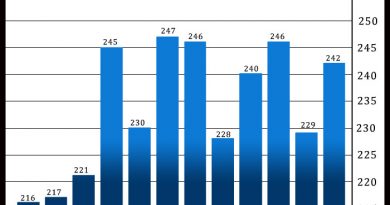Road to Retirement: Start 2021 on the right financial foot
Most people are happy to bid 2020 farewell and embrace the prospect of better times in 2021. In terms of your finances, here are five things you can do to improve your road to retirement.
Savings Rate. If you are still working, you should target an annual retirement savings rate of at least 12% of your pay. That means if your salary (or total household income if married) is $100,000, you should be saving at least $12,000 a year in your retirement plan. Note that if your employer makes a matching contribution, you can count this toward your 12%. For instance, if you receive a 3% match, then you only have to contribute 9%.
Some companies offer a Roth 401(k) option as well. With the Roth, you don’t get a current tax deduction, but the money grows and can be distributed tax free. Which is better? It’s hard to predict because the time frames are so long and tax laws change. A good approach is to split your contributions, half in the traditional 401(k) and half in the Roth 401(k). That way you are building both a tax-deferred and a tax-free pool of money for retirement.
If you don’t have a 401(k) at work, then you can utilize an IRA. Or if you are self-employed, something called a SEP IRA. If you aren’t familiar with how to set these up, most brokerage firms have folks who can help you with these retirement accounts. Call their retirement department and get some guidance. In a day or two, you can have your account up and running.
Mortgage Free. Put yourself on a path to be mortgage free by the time you retire. Let’s say you want to retire in 15 years, but you have 20 years left on your mortgage. You can adjust your monthly mortgage payment to pay extra each month. This extra money reduces your principal balance and will put you on a path to pay off the pay your mortgage faster.
For example, let’s say that 10 years ago, you took out a 30-year, $200,000 mortgage at 4.5%. You now have 20 years left. If you want to reduce it to 15 years, you’d have to increase your mortgage payment by about $220 per month. You can call your mortgage service provider and ask them to calculate these figures for you. If you’d like to play around with some scenarios, this site is helpful: dinkytown.net/java/mortgage-payoff-calculator.html
Refinance. Mortgage interest rates recently hit a record low, with some 30-year mortgages now under 2.7%. If you have a mortgage with an interest rate 0.5% or more above this, then you should look at refinancing. You may be able to refinance to a shorter mortgage schedule, for instance going from a 30 year to a 20 or 15 for not too much more in monthly mortgage costs.
If you are struggling to make your current payments, another option is to refinance to create more breathing room each month. For instance, let’s say your old mortgage is $200,000 at 4.5% with a monthly payment at $1,015. If you refinance to a new 30 year at a rate of 2.75%, your new payment is about $815 a month, or a $200 savings.
It will take you longer to pay off the house, but if you are struggling each month, then it’s better to reduce the mortgage payment to something that is sustainable. And if your income increases in the future, you can always pay more each month and reduce the term of the mortgage. The important thing is it gives you flexibility.
Health Care. After mortgage payments, the next largest cost for many families is health care. If you have a health savings account (HSA), try to fund this with as much money as you can. You get a tax deduction for every dollar you put into the account and the money you spend from the account on health care is tax free. The limits for 2021 are $3,600 if you have single coverage or $7,200 for family. If you are 55 or older, you can contribute an extra $1,000.
Any money contributed in a year and not used can be carried forward to future years. This helps you build a larger balance to handle costs down the road and even into retirement. Every health plan has an administrator, and if you need help, contact your administrator to find out how you can maximize your contributions.
Charlie Farrell is a CEO of Northstar Investment Advisors LLC. This article is for information and education purposes only. Past performance is no guarantee of future returns, and all investing involves the permanent risk of loss. Consult your individual financial adviser for guidance specific to your circumstances.
Source: Read Full Article


